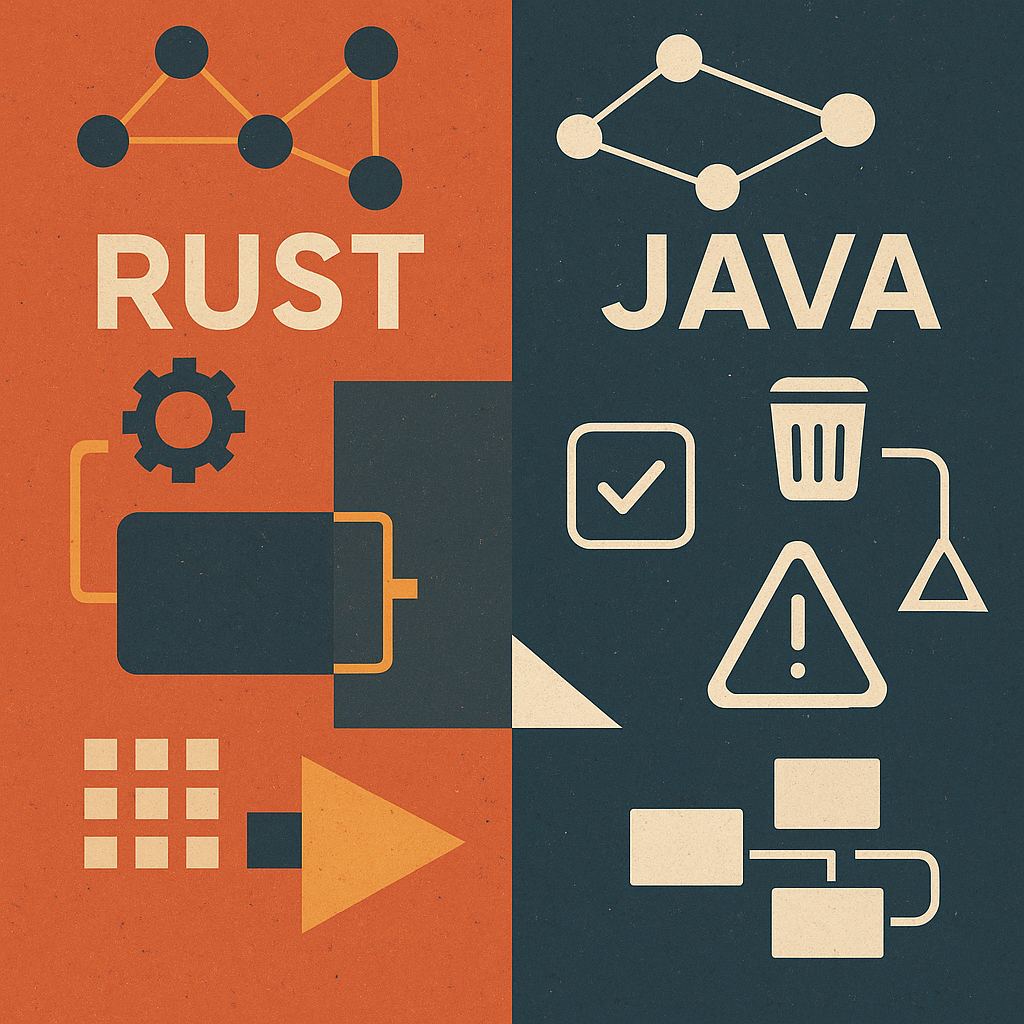In the world of modern programming languages, Java and Rust stand as two titans—each with its own philosophy, strengths, and trade-offs. While Java has been a cornerstone of enterprise software for decades, Rust has emerged as a modern systems programming language focused on safety and performance.
Whether you’re a Java developer exploring new languages or a systems programmer wondering if Rust is worth the hype, this article lays out the key differences between Rust and Java, with real-world implications.
⚙️ 1. Memory Management
Java:
Java uses a Garbage Collector (GC) to manage memory. It automatically reclaims memory that’s no longer in use, which simplifies development but can lead to unpredictable performance due to GC pauses.
Rust:
Rust uses a compile-time ownership model—no GC involved. It enforces strict rules on how memory is accessed, owned, and shared. As a result, you get deterministic memory management and zero-cost abstractions.
✅ Rust Advantage: High performance and fine-grained control over memory
🔁 Java Advantage: Easier for beginners; fewer worries about manual memory logic
🧵 2. Concurrency Model
Java:
Java has mature concurrency APIs: threads, Executors, ForkJoinPool, and CompletableFuture. But concurrency issues like race conditions and deadlocks still require careful management.
Rust:
Rust offers fearless concurrency via its ownership and borrowing rules, which are enforced at compile time. Race conditions are caught before code even runs.
✅ Rust Advantage: Compile-time safety in multithreaded environments
🔁 Java Advantage: Rich tooling and libraries for high-level concurrent patterns
🔐 3. Safety & Error Handling
Java:
Relies heavily on exceptions. Try/catch blocks are the norm, and runtime exceptions are common.
Rust:
No exceptions. Rust uses the Result and Option types to explicitly handle errors. This forces developers to consider error handling upfront, reducing hidden bugs.
✅ Rust Advantage: Safer and more robust code with fewer runtime surprises
🔁 Java Advantage: More forgiving syntax and easier for quick prototyping
🧱 4. Ecosystem & Libraries
Java:
Huge ecosystem built over 25+ years. Mature frameworks like Spring, Jakarta EE, and robust support for web, mobile (Android), and enterprise development.
Rust:
Growing ecosystem, with solid libraries for CLI tools, systems programming, and WebAssembly. However, still catching up in enterprise-level frameworks and tooling.
✅ Java Advantage: Rich ecosystem and enterprise readiness
🔁 Rust Advantage: Modern libraries, especially for systems-level development
🚀 5. Performance
Java:
Thanks to the JVM and JIT compilation, Java offers good performance with adaptive optimizations at runtime.
Rust:
Rust compiles directly to machine code using LLVM. Its performance often matches or exceeds C/C++ in critical areas like low-latency systems, embedded devices, and game engines.
✅ Rust Advantage: Predictable, low-level performance
🔁 Java Advantage: Optimized performance over time with warm-up and profiling
🧪 6. Tooling and Developer Experience
Java:
Strong IDE support (e.g., IntelliJ IDEA, Eclipse), debuggers, profilers, and mature build systems (Maven, Gradle).
Rust:
Excellent compiler with helpful error messages. Cargo (Rust’s package manager and build tool) is praised for its simplicity and power. IDE support is improving, with good integration in VS Code and JetBrains.
✅ Rust Advantage: Intuitive tooling and developer-focused compiler
🔁 Java Advantage: Mature, enterprise-grade tools and integrations
📚 7. Learning Curve
Java:
Friendly to beginners. Syntax is verbose but easy to follow. Broad community, extensive documentation, and a wealth of tutorials.
Rust:
Steeper learning curve due to the ownership model and strict compiler. However, the learning investment pays off with highly reliable and performant code.
✅ Java Advantage: Easier to learn and adopt in educational settings
🔁 Rust Advantage: Teaches strong fundamentals in systems thinking
👔 8. Use Cases
| Use Case | Java | Rust |
|---|---|---|
| Enterprise Apps | ✅ Mature and widely used | ❌ Still emerging |
| Web Development | ✅ Spring Boot, Jakarta | ⚠️ Actix, Rocket (still niche) |
| Android Development | ✅ Official support | ❌ Not used |
| CLI Tools | ⚠️ Possible, not ideal | ✅ Common and efficient |
| Game Dev / Embedded | ⚠️ Possible | ✅ Great for low-level code |
| Blockchain & WASM | ⚠️ Limited | ✅ Leading in these areas |
🧭 Conclusion
Rust and Java serve different needs, but both are incredibly powerful.
- Use Java if you need fast development, massive ecosystem support, and enterprise-grade tooling.
- Choose Rust when you need high performance, low-level control, and memory safety guarantees without garbage collection.
Ultimately, learning Rust as a Java developer can open your eyes to new paradigms and deepen your understanding of how computers really work. And that’s always a win.

Comments
One response to “Rust vs Java: The Key Differences Every Developer Should Know”
References:
📚 Official Documentation & Language Resources
Rust Programming Language Book (a.k.a. The Book)
https://doc.rust-lang.org/book/
Rust Standard Library Documentation
https://doc.rust-lang.org/std/
Java SE Documentation (Oracle)
https://docs.oracle.com/en/java/javase/
The Java™ Tutorials
https://docs.oracle.com/javase/tutorial/
Rust Error Handling: Result and Option
https://doc.rust-lang.org/book/ch09-00-error-handling.html
🔍 Performance and Memory Management
Rust Performance Myths (Nicholas Nethercote)
https://nnethercote.github.io/perf-book/
Java Garbage Collection Tuning Guide (Oracle)
https://docs.oracle.com/javase/8/docs/technotes/guides/vm/gctuning/
The Rustonomicon (Unsafe & Low-Level Programming)
https://doc.rust-lang.org/nomicon/
💬 Concurrency and Safety
Fearless Concurrency in Rust
https://doc.rust-lang.org/book/ch16-00-concurrency.html
Java Concurrency Tutorial
https://docs.oracle.com/javase/tutorial/essential/concurrency/
🛠️ Tooling and Ecosystem
Cargo Book (Rust Package Manager)
https://doc.rust-lang.org/cargo/
JetBrains Rust Plugin
https://www.jetbrains.com/rust/
IntelliJ IDEA for Java Developers
https://www.jetbrains.com/idea/
Rust vs Java Benchmarks (where available, e.g., The Benchmarks Game)
📰 Articles & Blog Posts
“Why Rust?” — Mozilla Blog
https://hacks.mozilla.org/2019/12/why-rust/
“Is Rust ready for Enterprise?” — Ferrous Systems Blog
https://ferrous-systems.com/blog/rust-in-enterprise/
“Java vs Rust: Which One Should You Choose?” — JetBrains Blog
https://blog.jetbrains.com